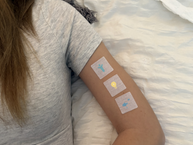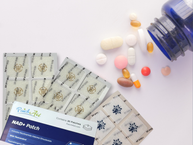A healthy, balanced diet can theoretically provide all of the essential nutrients, but are you sure you are getting what you need? It may be tricky to get enough of each of more than 20 vitamins and minerals every single day.
Going too long without getting enough can lead to nutrient deficiencies. If you have them, you may experience symptoms. And a healthcare provider might agree that you need a supplement, such as a PatchAid patch. These are 8 common signs that you may be deficient in vitamins.
Fatigue
Excessive fatigue can be related to a few different deficiencies. B vitamins, such as vitamin B1, vitamin B2, vitamin B3, and vitamin B5 are needed for proper metabolism of carbohydrates, protein, and fat into fuel for the body. Lack of iron, vitamin B12, and folate can also cause fatigue by causing red blood cells to carry less oxygen.
Poor night vision
Poor night vision can be an early but treatable symptom of vitamin A deficiency. If left untreated, xerophthalmia and blindness can occur - but these conditions are rare in the U.S.
Frequent infections
The immune system requires a number of nutrients to function properly. Vitamin C, iron, vitamin A, and vitamin D are a few examples. Taking a good look at your overall nutrient may help identify possible deficiencies causing susceptibility to infections.
Shortness of breath
Red blood cells contain hemoglobin, which helps carry oxygen around your body to deliver it to the cells that need it. Hemoglobin contains iron. If you are low in iron, the cells around your body may not be getting as much oxygen as they need. That can leave you breathing heavily to try to get more oxygen into your body. You may notice it first while exercising or climbing stairs, but severe iron deficiency can leave you with shortness of breath around the clock.
Rash
Your skin can tell you a lot about nutritional status. A rash, or red, scaly skin, can be the result of biotin deficiency. Niacin deficiency and inadequate amounts of essential fatty acids can also lead to poor skin health.
Hair loss
Hair is just dead cells, right? But hair loss can indicate nutrient deficiency. Protein is one possible culprit, but other nutrients are necessary for healthy hair. Deficiencies of zinc, iron, and biotin can all lead to hair loss. Niacin, or vitamin B3, is another essential nutrient for healthy hair.
Brittle nails
Iron and biotin deficiency can lead to brittle nails. Nails can become spoon-shaped with severe iron deficiency.
Cracked and bleeding gums and mouth sores
Vitamin C deficiency can lead to sores in the mouth, as well as tooth loss and bleeding gums. Deficiency of riboflavin, or vitamin B2, can lead to cracked, bleeding areas at the corners of the mouth.
If you think you may be deficient in vitamins and minerals, it is best to ask your doctor for help. She can order tests for a number of different nutrients. And she may be able to assess your dietary intake or refer you to a nutritionist who can.
If it turns out that you have one or more deficiencies, or are at risk for them, nutritional supplements may be the way to go. Discuss the possibilities with your doctor and see which PatchAid patches may be best for you to try. Overcoming vitamin deficiencies can alleviate their symptoms and make you feel better.







